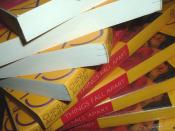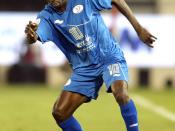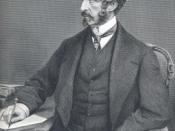In the novel Things Fall Apart by Chinua Achebe, ÃÂthings fall apartÃÂ for the character Okonkwo because of his character traits. Okonkwo is a very structured man with little patience for whatever he believes is wrong. Some of OkonkwoÃÂs negative character traits include his violent temper, which gets him in trouble with his religion, clan, family and the missionaries, and his constant battles with his own father which cause him to believe in what is wrong, even if he is aware of what is right. As well, Okonkwo being such a structured man is a good feature of his personal nature, but even this has a negative effect on his life. Okonkwo is an extremely complex character created by Chinua Achebe, and his life ÃÂfalls apartÃÂ because of all of these factors.
Okonkwo believes that the worst thing you could do is be a woman while you are a man.
This is a character trait that helps tear his life apart. OkonkwoÃÂs father, Unoka, causes Okonkwo to be confused about life. Unoka was a complete failure in the eyes of the Umuofia people because of his effeminate way of thinking, and, ÃÂWhen Unoka died he had taken no title at all and he was heavily in debt.ÃÂ(p.5, Things Fall Apart). Okonkwo is so greatly ashamed of his father that he based many of his beliefs about how life should be lived by doing things exactly the opposite to that of his father. At first, Okonkwo had much success doing this, but his mind was so strongly warped that he did not develop a well rounded personality and thought only of doing things so he would not be considered a woman. Okonkwo was fully aware that many of the actions that he took, solely to be more of a man, were wrong to do. Unfortunately, Okonkwo so strongly felt that everyone would respect him for making manly decisions in place of wise decisions that he would do things to cause his life to crumble.
IkemefunaÃÂs death is an excellent example of OkonkwoÃÂs immense fear of being effeminate, like his father. When the Oracle sentenced Ikemefuna to be killed, Okonkwo felt deeply about killing the boy. Ikemefuna did a lot for Okonkwo and his family. He was a role model for Nwoye, ÃÂ He made him feel grown up; and they no longer spent the evenings in motherÃÂs hut while she cooked , but know sat with Okonkwo in his obi,ÃÂ ÃÂ(p. 45). There was nothing that Okonkwo could do to stop the boy from being killed but he could make things slightly better by not being involved with the death, as Obierika had suggested. Unfortunately, Okonkwo went against what he believed was right and was apart of the party that put Ikemefuna to death, solely because Okonkwo does not want to seem weak, like his father. If Ikemefuna had not been killed, Nwoye would not have turned to the missionaries. In the novel, after the missionaries finished singing, Nwoye pondered about want he had just heard, ÃÂThe hymn about brothers who sat in darkness and in fear seemed to answer a vague and persistent question that haunted his young soulÃÂ the question of Ikemufuna who died.ÃÂ(p. 128). It has Nwoye believing that Okonkwo had taken part in the death of Ikemufuna that pushed him into Christianity and caused Okonkwo to loose respect in himself for not being able to raise a ÃÂsuccessfulÃÂ son. This also caused Okonkwo to be angry at the missionaries instead of only amused by there ÃÂfoolishnessÃÂ. OkonkwoÃÂs intense desire to be a man before all else caused him to make unwise decisions that made him pay in time. If Okonkwo did not have this personality trait, perhaps he would make wiser decisions that would have helped him and his family to be more respected.
Okonkwo has a fierce temper that causes him to take actions that do not help him in his quest for power within his tribe. ÃÂÃÂ Whenever he was angry and could not get his words out quickly enough, he would use his fists.ÃÂ(p.2). He is a very rash person and, when in a fit of rage, does not think about the consequences of his actions. During the ÃÂWeek of PeaceÃÂ, Okonkwo was angry at Ojiugo for not arranging OkonkwoÃÂs diner before she left to plait her hair without telling him. ÃÂHe walked back to his obi to await OjiugoÃÂs return. And when she returned he beat her very heavily. In his anger he had forgotten that it was the Week of Peace.ÃÂ(p.25). After this incident, Okonkwo lost much respect from the clan because it was the first time in many years that anyone had committed an nso-ani as Okonkwo did. OkonkwoÃÂs final violent action caused by his temper was when the messenger for the missionaries proclaimed that the tribal meeting being held must stop. Okonkwo cut the messengers head off, ÃÂHe knew that Umuofia would not go to war. He knew it because they had let the other messengers escape.ÃÂ(.178). Okonkwo did this out of fury and frustration that his tribe was changing so obediently. This was OkonkwoÃÂs final action because it basically forced him to kill himself or be hung. OkonkwoÃÂs raging temper was a trait that caused life to be harder for him. It may have made him be seen as a strong, powerful man, but it worked against him at critical times to cause things to ÃÂfall apartÃÂ for him.
The missionaries that inhabited Umuofia caused many problems for Okonkwo because of the structure they brought with them. Okonkwo is a painfully structured man. If something is not right with his schedule, like when Ojiugo did not make him his diner, he becomes irrational. Okonkwo always has a plan which seems to always have to change. Just when he figured he would have the highest rank he could achieve in his tribe, his gun explodes and kills a fellow clansman so that he has to flee to his motherland for seven years. Okonkwo then devises a plan for when he returns to Umuofia so that he can still achieve the highest rank. When Okonkwo returns however, his plan cannot go into effect because the missionaries have made many changes in Umuofia. The missionaries changed the structure of the tribe, which angered Okonkwo. ÃÂThe white man had indeed brought a lunatic religion, but he had also built a trading store and for the first time palm-oil and kernel became things of great price, and much money flowed into Umuofia.ÃÂ(p.152). Okonkwo could never handle men that he believed to be feminine. Throughout the novel, Okonkwo is backed up by his tribe when he rejects others for being effeminate. But when the missionaries arrived and acted, in OkonkwoÃÂs opinion, like women, the tribe saw them differently, compared to how they had originally, and turned their backs on Okonkwo. Okonkwo could not handle this, and mixed with his other crucial character traits, it is what that drove him to kill the messenger in the climax of the novel and, eventually, himself.
The character Okonkwo in Things Fall Apart by Achebe has many problems with his personal nature that causes his life to be destroyed. OkonkwoÃÂs issues with his fatherÃÂs failure in contrast to his own success in life led him to believe that the sword is mightier than the pen rather then ÃÂThe pen is mightier than the swordÃÂ (Edward Bulwer-Lytton). As well, his furious temper was a problem that, mixed with his thoughts about being a man, led to actions that were unwise for his quest of a life opposing that of his fathers. His structure being diverted constantly was too much for a man with as many problems as Okonkwo, and this was the main character trait that caused so many things to ÃÂfall apartÃÂ for Okonkwo and lead to OkonkwoÃÂs end.
BibliographyAll quotes and page numbers from the novel:Things Fall Apart by Chinua Achebe





